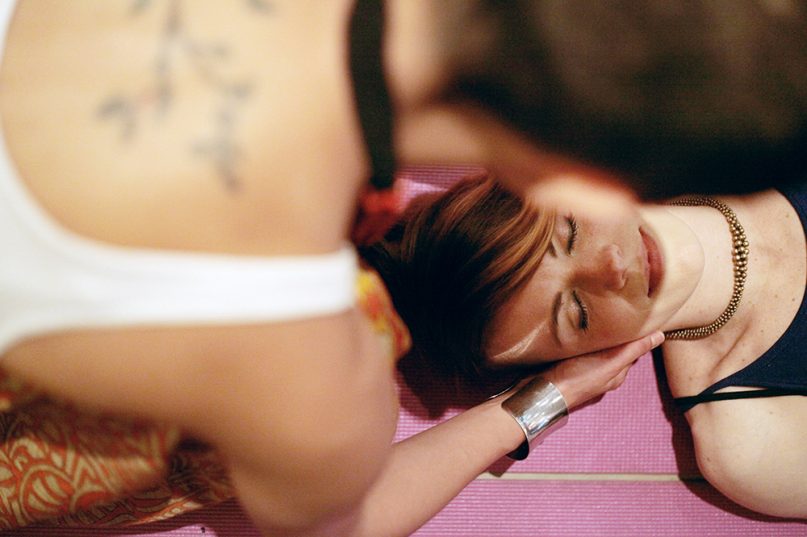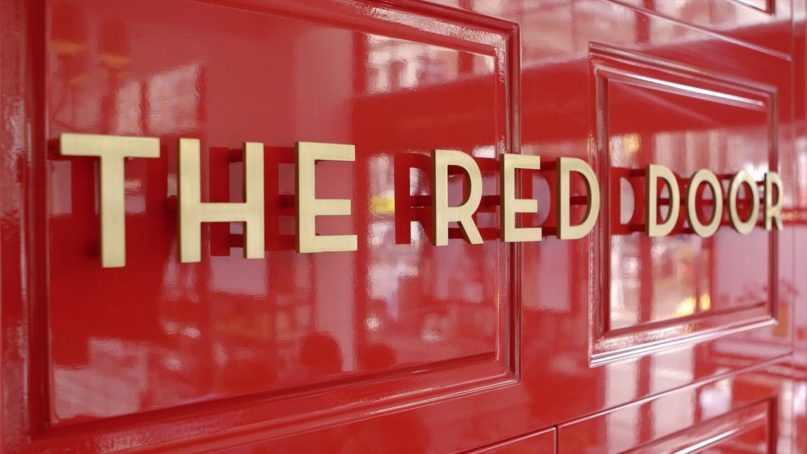(RNS) — Last night I tried to schedule an appointment at a hair salon. A friend had recommended a stylist at The Red Door — Elizabeth Arden’s New York salon and spa. For decades, what lay behind the company’s aspirational “Red Door” represented the peak of American feminine glamour. As one number in the 2017 musical “War Paint,” dramatizing the midcentury rivalry between Arden and makeup rival Helena Rubinstein, attested:
“Enter Miss Arden’s temple to beauty/Serving your every need is our duty/May you enjoy the full day you have in store/Behind the Red Door!”
This fall, however, the red door is being rebranded a millennial-pink hue. The Red Door, it turns out, is now called Mynd Spa and Salon, a “self-care journey with the same perks” as its upscale predecessor. “Mad Men”-style glamour and unattainability is out. Spiritual refreshment is in.
“No matter how you define self-care,” proclaims a Mynd advertisement that has been following me around the Internet, “Mynd is a resource … focused on helping you achieve lasting beauty and wellness.”
The advertisement goes on: “At Mynd, you’ll find self-care you can confidently say is my.” The grammatical weirdness only adds to the sense that Mynd seems to have been created by a branding bot developed to appeal to millennial audiences. It’s a little bit spiritual (it’s a “journey,” after all), and utterly bespoke (“is my”). It’s at once on the nose and unsettlingly inauthentic: the how do, fellow millennials of branding.

A woman receives a massage. Photo courtesy of Creative Commons
Elizabeth Arden is not the first well-known brand to pivot to wellness. Last year, Weight Watchers redefined itself as “WW” and a tagline that promises “Wellness That Works,” minimizing its focus on dieting and instead partnering with meditation app Headspace to encourage its subscribers to live (and eat) more mindfully.
In the halcyon days of self-pampering, as we called it in the “Mad Men” era (Betty Draper, no doubt, got her facials at Elizabeth Arden), the way beauty retailers moved a product was through sex and, to a lesser extent, money. You weren’t just selling a face cream, or a salon, or a spa, you were selling ideas of beauty, of glamour, of hauteur and wealth and inaccessibility. What the advertisements from the 1960s were designed to evoke was carnal (or, at least, venal).
But today’s advertisements are designed to evoke different and more numinous emotions: spiritual well-being, an inward journey, a moral sensibility. We’re buying the very things that organized religion used to provide us for free.
These new takes on advertising can draw controversy, as when Nike celebrated Colin Kaepernick’s decision to “Take a Knee” to exhibit his support of the Black Lives Matter movement (“Believe in something. Even if it means sacrificing everything”), garnering the wrath of more than a few white evangelical pastors. Chick-fil-A has donated to anti-LGBT-marriage groups. Companies are increasingly tailoring their advertising, using political advocacy or activism to sell themselves as moral arbitrators. They are selling not just products but values.
In so doing, these brands are selling meaning as a product, reframing capitalist consumption as a religious ritual: a repeated and intentional activity that connects the individual self to its divine purpose, or at least a set of meaningful values. For the 36% of young millennials who identify as “religiously unaffiliated” — a demographic that strongly leans progressive left and tends to respond to the narrative ad language of social justice — commercial brands offer a vision of spirituality that’s linked, often, both with personal self-improvement and wider social utopianism.

A still from Gillette’s “The Best Men Can Be” ad campaign about showing young males good examples of proper behavior. Video screengrab
Take, for example, Gillette, which primarily sells razors and other shaving products. Traditionally, a razor brand would advertise its products’ usefulness or emphasize its sex appeal: “Buy this razor, it’ll make you look more refined (or rugged).” Back in 1989, this took the form of the “Best a Man Can Get” campaign. The company’s Super Bowl ads — traditionally the apex of the advertising season — featured men playing sports, cavorting with beautiful women and otherwise appearing like someone any American man would want to emulate.
By 2019, Gillette’s advertising campaign had become a direct response to the #MeToo movement. Its Super Bowl commercial — now titled “The Best Men Can Be” — encouraged men to step in when women were being mistreated, to evaluate whether their own behavior was inadvertently misogynistic.
The commercial was largely pilloried — by the right as being misandristic, by the left as having pandered too obviously to “woke” culture — but its goal was one increasingly shared by brands across the political spectrum. By liking or sharing the ad, or by buying the razors themselves, would-be consumers were joining a different kind of unified “tribe”: Gillette customers. They were publicly allying themselves with Gillette’s “woke” values — and with other people who shared those values.
In buying a Gillette razor, they weren’t just buying a razor or even a personal or experiential fantasy; they were buying a social and ethical fantasy: the fantasy of belonging to a moral community.
This doesn’t only work for men. In rebranding as Mynd, Elizabeth Arden isn’t just luring millennials with popular “young people” slogans; it’s changing the goalposts of “aspirational” branding — reimagining what we should be aspiring for. We no longer wish to sneak behind the red door to get a glimpse of how the other half lives. Instead, we want to take that bespoke “self-care journey” into our own inner selves.






